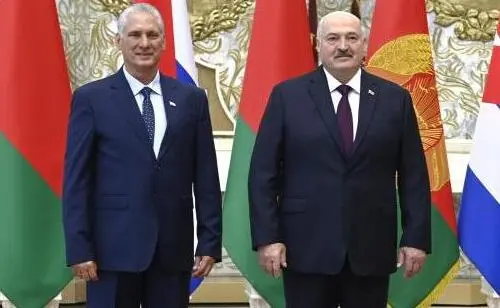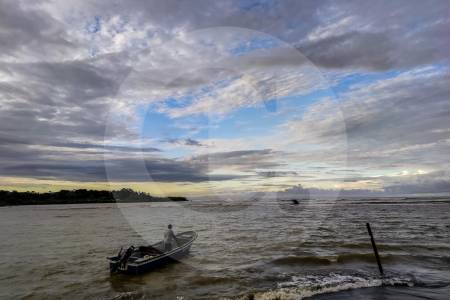
Who Is Lukashenko, the “Last Dictator of Europe,” Who Just Received Díaz-Canel?
- Cuba
- junio 30, 2025
- No Comment
- 42
Lukashenko, who has ruled Belarus since 1994, welcomed Díaz-Canel in Minsk this Wednesday.
MIAMI, United States – The official visit of Cuban ruler Miguel Díaz-Canel to the Republic of Belarus has once again brought attention to Aleksandr Lukashenko, who is described by specialized media as the “last dictator of Europe” due to his more than three decades in power and his authoritarian style of governance.
Lukashenko, president of Belarus since 1994, received Díaz-Canel in Minsk on June 25th, as part of an agenda that included bilateral meetings and the Cuban leader’s participation in the Supreme Council of the Eurasian Economic Union.
According to the official newspaper Granma, the visit aims to “reaffirm and strengthen” ties between the two governments. However, beyond the diplomatic gesture, Lukashenko’s figure continues to spark international controversy due to the repressive nature of his regime.
Lukashenko has held absolute power in Belarus for over three decades and has ruled through “elections and referendums that have been internationally questioned,” during which he abolished term limits and expanded his presidential powers, according to an article published by the LISA Institute in January of this year. The same research center defines him as “the last dictator of Europe.”
Born in 1954 in the former Soviet Socialist Republic of Belarus, Lukashenko began his political career in 1990 as a deputy of the Supreme Soviet. He was elected president in 1994 after winning 80.1% of the vote in the second round of the country’s first democratic elections. Since then, he has been re-elected in every election, always under accusations of fraud and repression of the opposition.
Throughout his rule, he has consolidated a highly centralized system, with state control over the economy, media, and judiciary. The LISA Institute report highlights that his government has been marked by “arbitrary detentions, repression of activists, journalists, and opposition politicians,” as well as the retention of the death penalty.
The most recent political crisis occurred after the 2020 presidential elections, in which Lukashenko was declared the winner with 80.2% of the vote against opposition candidate Svetlana Tikhanovskaya. The international community, including the European Union and the United States, rejected the results as fraudulent. The violent crackdown on subsequent protests led to new international sanctions and the regime’s diplomatic isolation.
Despite this, Lukashenko maintains a domestic support base, particularly among sectors that benefit from his subsidy and welfare policies. Under his government, poverty fell from 41.9% in 1992 to 5.6% in 2020, according to World Bank data, and the unemployment rate officially remains below 1%. His economic model, described as “market socialism,” combines state intervention, the renationalization of companies, and price controls.
The dictator has also strengthened his strategic alliance with Russia. In 1999, he promoted the creation of the Union State of Russia and Belarus, and he is a founding member of the Collective Security Treaty Organization (CSTO), a Moscow-led political-military alliance. Belarus has also served as a logistical support platform for Russian military operations, including the invasion of Ukraine.
Lukashenko’s biography also stands out for his military background and ties to the Soviet apparatus. Holding degrees in History and Agricultural Sciences, he was a political commissar in the Red Army and a manager of a state farm before beginning his parliamentary career. In 1993, he was appointed chairman of the parliament’s Anti-Corruption Committee, a position from which he denounced high-ranking officials, helping him build an “outsider” image against the traditional elites.
Since then, he has ruled without alternation. In 2004, a referendum eliminated the two-term presidential limit, paving the way for his indefinite hold on power. In February 2024, he announced his intention to run again in the elections scheduled for January 2025.
“The president himself has always justified his authoritarian style of governance as necessary to ‘keep the country under control and not harm people’s lives,’” states the LISA Institute report. However, organizations such as the OSCE, Human Rights Watch, and Amnesty International have systematically documented human rights violations under his regime.
Miguel Díaz-Canel’s visit to Minsk has been officially celebrated by the Belarusian government, which displayed Cuban flags along the main avenues of the capital. However, for many observers, the meeting between the two leaders represents the affinity between two power models defined by authoritarianism, control of the state apparatus, and outright rejection of Western liberal democracies.
Recibe la información de CubaNet en tu celular a través de WhatsApp. Envíanos un mensaje con la palabra “CUBA” al teléfono +1 (786) 316-2072, también puedes suscribirte a nuestro boletín electrónico dando click aquí.
Sigue nuestro canal de WhatsApp. Recibe la información de CubaNet en tu celular a través de Telegram.




